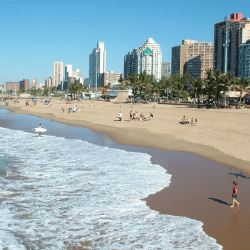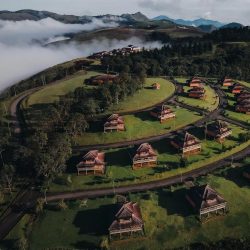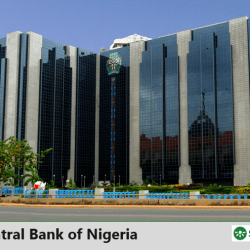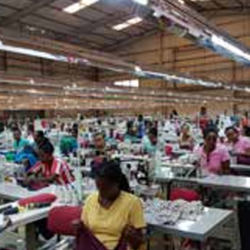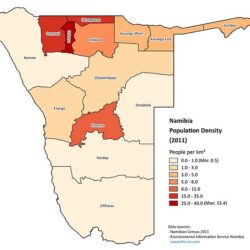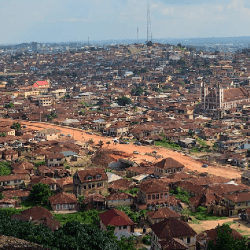Agriculture is the main occupation of the people, providing income and employment for a large percentage of the population. Ogun State is blessed with a conducive climate that supports cultivation of a variety of crops such as yam, cassava, maize, rice, plantain, beans, vegetables and citrus fruits such as orange, paw-paw, pineapple and so on. The main cash crops produced in the State are cocoa, cashew, kola nut, oil palm and palm kernels, rubber and coffee.
The Agricultural Policy of the State is to increase agricultural output substantially as a weapon against malnutrition and a means of improving the standard of living of the people, as well as producing for export.
The State is a major producer of kolanut in the country. The State also produces rubber on a large scale, as well as timber of various species. Out of the total land area of about 16,409 square kilometres, about 20 per cent is preserved as forest reserves. The Forest Reserves have over 26,352ha of gmelina, teak and pine. All these species are available
as raw material for pulp and other wood based industries. Because of their abundant natural resources,. ample level of infrastructure and availability of recreational facilities, these forest reserves have become a viable Tourist Centre.
There are large-scale industries in the State, both privately and publicly owned. The private industries include cement, pharmaceuticals, paint, ceramics, roofing sheets, plastic, agro allied, foods and beverages, foam, breweries, distilleries, soaps and detergents, to mention a few. Government-owned industries are the Gateway Pharmaceutical Company Limited, Ikangba, Gateway Industrial and Technical Company Limited, Gateway Hotels at Abeokuta, Ijebu-Ode and Otta, amongst others. Moreover, Iwopin (Ogun Waterside) is witnessing a rebirth in the development of the multimillion naira Paper Mill in the State. There is also a salt Industry at Ijoko Ota. As a complement to the economic activities of the State, there is a good network of roads for the transportation of goods. However, transportation within the coastal areas of the State is by speedboats and canoes.
The basic objectives of setting up most of the industries are to meet the local demands for manufactured goods, provide industrial outlets for locally produced raw materials and provide employment opportunities for both skilled and unskilled manpower.
While some people find employment in the public service, others are engaged in private concerns, and specialise in professions such as tailoring, wood works and carpentry, cloth weaving, tie ‘and dye and the like. The small scale industries are mainly private initiatives. These include farming, bakery, sawmilling, metal fabrication, woodworks and carpentry.
Within the rural society, the major traditional economic activity of women is subsistence farming. Some of the literate women in the urban areas are employed in the mainstream of the public service, while a number of others are engaged in petty trading. The riverine areas of the State specialise in fishing, lumbering and boat building.
Both the Federal and the Ogun State Governments provide a wide range of gainful employment in the State through the long established Public Service, which include the Judiciary, the Military, the Police Force, Customs, Immigration and Prison Services, Local Government service, Residential and Industrial Estates and Sports Stadia.
Ogun State
Ogun is a major industrial state in Nigeria. It is located in the country’s south western zone.
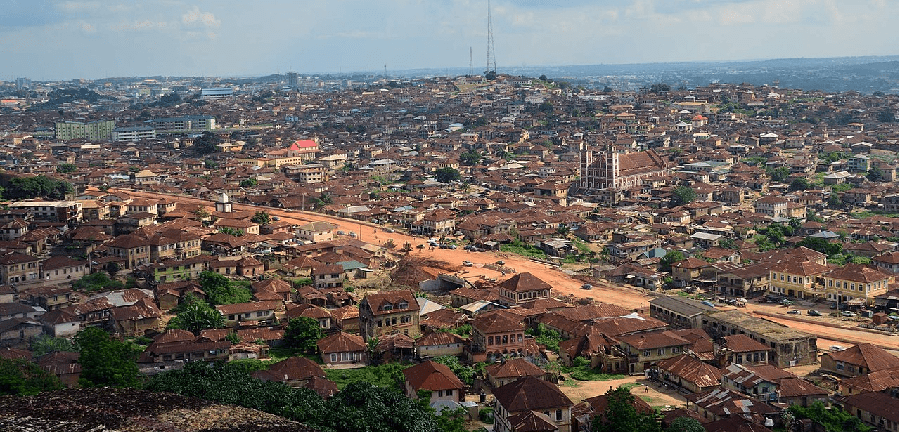
Nicknamed the “Gateway to Nigeria”, the state is notable for having a high concentration of industrial estates and being a major manufacturing hub in Nigeria.
Major factories in Ogun include the Dangote Cement factory in Ibese, Nestle, Lafarge Cement factory in Ewekoro, Memmcol in Orimerunmu, Coleman Cables in Sagamu and Arepo, Procter & Gamble in Agbara, amongst others.
Founded
It was created on 3 February 1976 from the former Western State.
Boundaries
Ogun State borders Lagos State to the south, Oyo State and Osun State to the north, Ondo State to the east, and the Republic of Benin to the west.
Capital
Abeokuta is both Ogun State’s capital and most populous city
Important cities
Important cities in the state include Abeokuta , Ijebu Ode, the royal capital of the Ijebu Kingdom, and Sagamu, Nigeria’s leading kola nut grower.


Geography
Ogun state is covered predominantly by rain forest and has wooden savanna in the northwest.
Land area
Ogun State has a Land Area of 16,409.26 square kilometers.
Major tribe
Ogun State is mostly Yoruba with the Yoruba language serving as the major one in the state.
Religion
The main religion in Ogun State is Christianity. A certain amount of other religions are being practiced.
Agriculture
Ogun State is noted for being the almost exclusive site of Ofada rice production.
TOURISM SITES
Olumo Rock in Abeokuta, Birikisu Sugbo Shrine at Oke-Eri, Yemoji Natural Swimming Pool at Ijebu-Ode, Oyan Dam in Abeokuta North, Iwopin Boat Regatta and Ebute-Oni in Ogun Waterside.
Other Sites are Madam Tinubu Shrine in Abeokuta, Oronna Shrine in Ilaro, Area J4 Forest Reserve; Tongeji Island in Ipokia, Old Manse at Ogbe, Abeokuta, St. James Anglican School, Ota and Ijamido River Shrine in Ota.
Check out our Tourism Gallery
LOCAL GOVERNMENT AREAS
- Abeokuta -North
- Abeokuta South
- Ado-Odo/Ota
- Ewekoro
- Ifo
- Ijebu East
- Ijebu North
- Ijebu North-East
- Ijebu-Ode
- Ikenne
- Imeko-Afon
- Ipokia
- Obafemi/ Owode
- Odeda
- Odogbolu
- Ogun Waterside
- Remo North
- Sagamu
- Yewa North
- Yewa South
THE PEOPLE
The People of Ogun State belong to the Yoruba Ethnic Group of South-West Nigeria and also live in parts of Benin Republic and Togo, with substantial Diaspora elements in Brazil, Cuba and Sierra Leone, consequential to the Trans-Atlantic Slave Trade.
The Sub-groups are mainly the Egba, Yewa, Awori, Egun, Ijebu, Remo, Ikale and Ilaje, Anago, Ketu, Ohori etc.
PROMINENT PERSONS
Ogun is also home to many icons in Nigeria in particular and Africa in general.
Ogun sons and daughters make their mark in diverse professions and have contributed in no small measure to the development of the state and Nigeria both at home and abroad.
Ogun State has produced icons and pioneers such as:
• Alexander Akintola Sapara-Williams
The first Nigerian Lawyer
• Hon. Justice Olumuyiwa Jibowu
The first Nigerian Judge to sit on the Supreme Court Bench
• Sir Adetokunbo Ademola
The first Indigenous Chief Justice of Nigeria
• Chief Simeon Adebo
Pioneer Permanent Secretary, Head of Civil Service and Permanent Representative of Nigeria at the United Nations
• Chief Obafemi Awolowo
The first Nigerian Lawyer to head a Regional Government
• Professor Wole Soyinka
Black Africa’s first Nobel Laureate
• Adeoye Lambo
One-time Deputy Director General of the World Health Organisation
• Prof. Anthony Asiwaju
Renowned Historian
• Chief J. F. Odunjo
Foremost Author
• Oluṣẹgun Arẹmu Ọbasanjọ
A former Nigerian Army general and former President of Nigeria
LANGUAGES
Yoruba and English (Official Language) and several dialects of the sub-groups.
FESTIVALS
Agemo, Lisabi, Ogun, Igunnuko, Orisa-Oko, Egungun, Obirin-Ojowu, Gelede, Oro, Ojude-Oba and Sango.
POPULATION
The population of Ogun State based on 2006 Census was 3,751,140 comprising of 1,864,907 Males and 1,886,233 Females.
However, the projected population as at 2011 Census is 4,397,604 with 2,186,301 Males and 2,211,303 Females
The State is endowed with a favourable climate and good vegetation for all year round cultivation of various cash and food crops as well as livestock rearing.
VEGETATION
The climate is also conducive for business and industrial growth. In Ogun State, we have in the south, the evergreen forest vegetation and soil most suitable for the cultivation of cash and food crops like oil palm, rice, kola- nut, cocoa, cotton, cassava, cocoyam and vegetables. While in the north, we have a vast grazing savannah land that is suitable for animal husbandry. In addition to this, there are forest reserves, rivers and lagoons with a beautiful ocean front down south that is good for beach resorts.
NATURAL RESOURCES
The State has natural resources that include forest and water bodies as well as large quantities of mineral deposits, such as limestone, phosphate, granite stone, gypsum, bauxite, bitumen, feldspar, clay, glass sand, kaolin, quartz, tar sand and gemstones.

